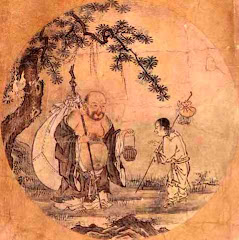
In the Upanishads there is a beautiful story. Shvetketu, a young man, came back from the university full of knowledge. He was a brilliant student, he had topped the university with all the medals and all the degrees that were possible, available. He came back home with great pride. His old father, Uddalak, looked at him and asked him a single question. He said to him, "You have come full of knowledge, but do you know the knower? You have accumulated much information, your consciousness is full of borrowed wisdom -- but what is this consciousness? Do you know who you are?"
Shvetketu said, "But this question was never raised in the university. I have learned the Vedas, I have learned language, philosophy, poetry, literature, history, geography. I have learned all that was available in the university, but this was not a subject at all. You are asking a very strange question; nobody ever asked me in the university. It was not on the syllabus, it was not in my course." Uddalak said, "You do one thing: be on a fast for two weeks, then I will ask you something."
He wanted to show his knowledge, just a young man's desire. He must have dreamed that his father would be very happy. Although the father was saying, "Wait for two weeks and fast," he started talking about the ultimate, the absolute, the Brahman.
The father said, "You wait two weeks, then we will discuss about Brahman."
Two days' fast, three days' fast, four days' fast, and the father started asking him, "What is Brahman?" In the beginning he answered a little bit, recited what he had crammed, displayed. But by the end of the week he was so tired, so exhausted, so hungry, that when the father asked, "What is Brahman?" he said, "Stop all this nonsense! I am hungry, I think only of food and you are asking me what Brahman is.
Right now, except food nothing is Brahman."
The father said, "So your whole knowledge is just because you were not starved. Because you were taken care of, your body was nourished, it was easy for you to talk about great philosophy. Now is the real question. Now bring your knowledge!"
Shvetketu said, "I have forgotten all. Only one thing haunts me: hunger, hunger -- day in, day out. I cannot sleep, I cannot rest. There is fire in my belly, I am burning, and I don't know anything at all. I have forgotten all that I have learned."
The father said, "My son, food is the first step towards Brahman. Food is Brahman -- ANNAM BRAHMA." A tremendously significant statement.
India has forgotten it completely. ANNAM BRAHMA: food is God, the first God.
If you drop the analytical mind, science disappears. If you drop the analytical mind, you can't be affluent; you are bound to be poor and hungry, and you will lose your first contact with God.
The West is in that contact; nothing is wrong about it. This orientation in analysis is a significant step towards knowing God. But one should not stop at it. Food is not an ultimate value, it is a means to an end. And if you have a meditative pilgrimage you start transforming food into prayer.
It depends. The painter eats the same food, but it becomes painting in him. The poet also eats the same food, it becomes poetry in him. The lover also eats the same food, it becomes love in him. The murderer also eats the same food, it becomes murder and destruction in him.
Alexander, Genghis Khan, Adolf Hitler, Gautam Buddha, Jesus Christ and Krishna, they were not eating different kinds of food; the food is the same, more or less. But in Adolf Hitler it becomes destruction, in Gautam Buddha it becomes compassion. Food is raw energy; it depends on you how you transform it. You are the transformer; you are really significant, not what you eat.
Money is not bad in itself. Money is neutral, it depends on you. In the hands of a man of understanding, money is tremendously beautiful.
It can become music, it can become art, it can become science, it can become religion. It is not money that is bad, it is the person. The stupid person, if he has money, does not know what to do with it; his money creates more greed. Money can free you from greed, but the stupid person changes money into more greed. It becomes anger, it becomes sexuality, it becomes lust. The more money the stupid person has, the more stupid he becomes, because he becomes more powerful to do stupid things.
With the wise, everything is transformed into wisdom.









